Why Do Second-Generation Factory Owners Thrive in Xiaohongshu's E-commerce Sphere?
![]() 01/21 2025
01/21 2025
![]() 516
516
Introduction: What unique opportunities do these "factory second-generation" entrepreneurs see in this platform?

Author: Lu Yan | Produced by Lishi Business Review
1
For a considerable time, "factory second-generation" and "Xiaohongshu" were two seemingly disparate concepts.
Mention "factory second-generation," and people envision them toiling on factory production lines, managing complex operations daily, leading monotonous lives. Conversely, "Xiaohongshu" evokes images of trendy lifestyles and vibrant communities.
However, these two worlds collided in Xiaohongshu e-commerce's recently released 2024 rise100 annual e-commerce list. A cohort of "factory second-generation" entrepreneurs has emerged on Xiaohongshu, establishing businesses that have secured prominent positions among the top 100 merchants based on scale, performance, and growth speed.
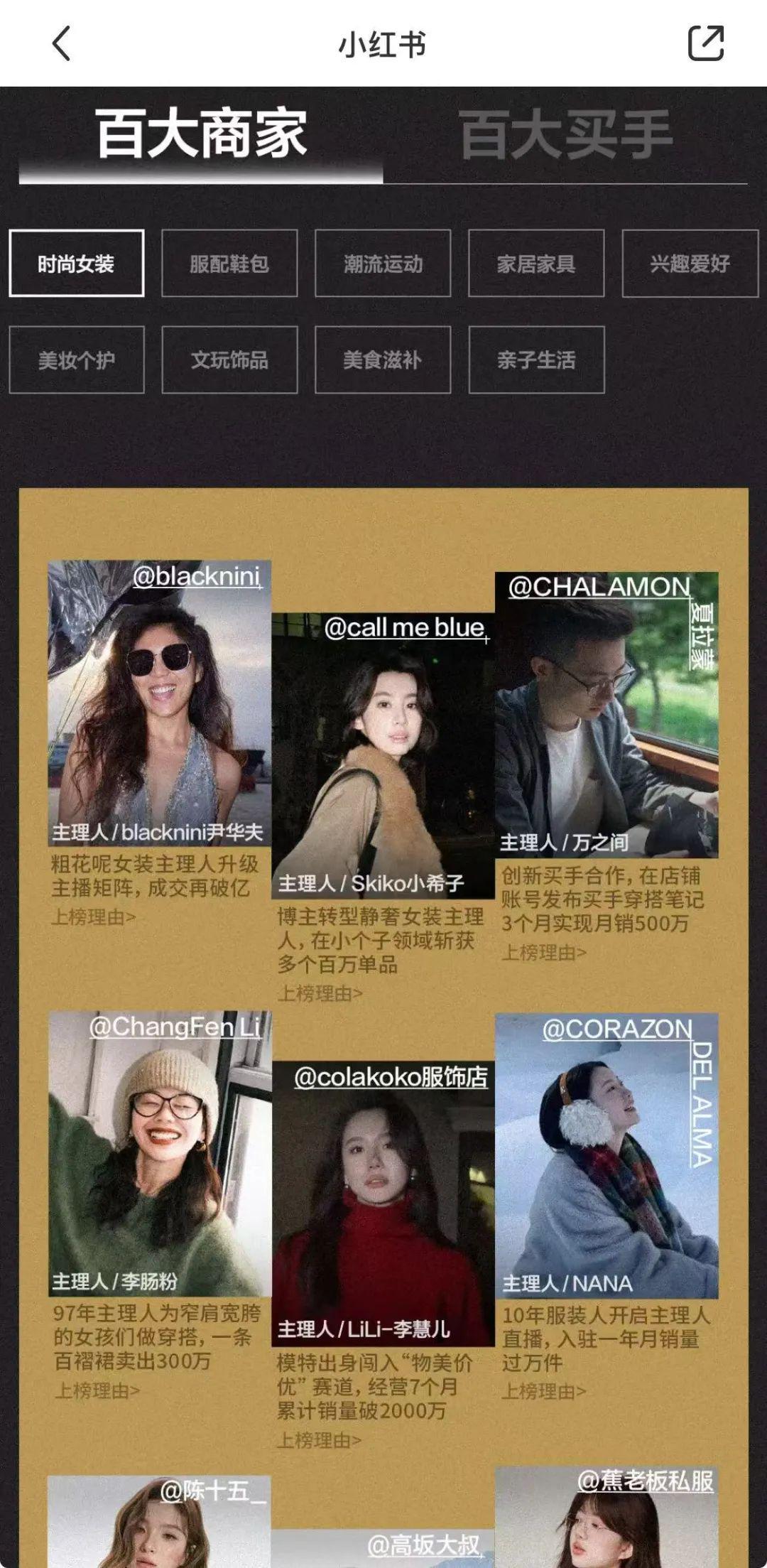
*Xiaohongshu Screenshot
In China's brand and consumer goods landscape, factories of various sizes scattered across industrial belts form a crucial group. Many of these factories historically focused on OEM production services, lacking independent operational acumen, systematic enterprise management capabilities, and a strong sense of brand creation.
As the children of these founders grew up, many entered the family business. Unlike their parents, the "factory first-generation," these "factory second-generation" entrepreneurs exhibit new common traits. They are deeply immersed in the family business from a young age, intimately familiar with the product areas. Additionally, they possess agile minds, no longer content with merely providing OEM services or being confined to regional markets.
Some of these "factory second-generation" entrepreneurs recognized an opportunity to become "brand leaders" on Xiaohongshu, leveraging their product and industry knowledge to transform supply chain advantages into successful businesses or even brands through content creation and live streaming.
From fashion apparel to home furnishings, accessories, footwear, and bags, to parent-child lifestyle products, the "factory second-generation" cohort among Xiaohongshu's top 100 merchants has explored new business ventures. However, the question arises: how can these successors outperform their predecessors?
2
Apanda, the head of the "Sinabo" brand, epitomizes the "factory second-generation." His family runs a furniture production business that previously provided OEM services to foreign brands. Inspired by Nordic furniture he encountered during travels abroad, he founded the "Sinabo" brand with a Nordic style in 2010.
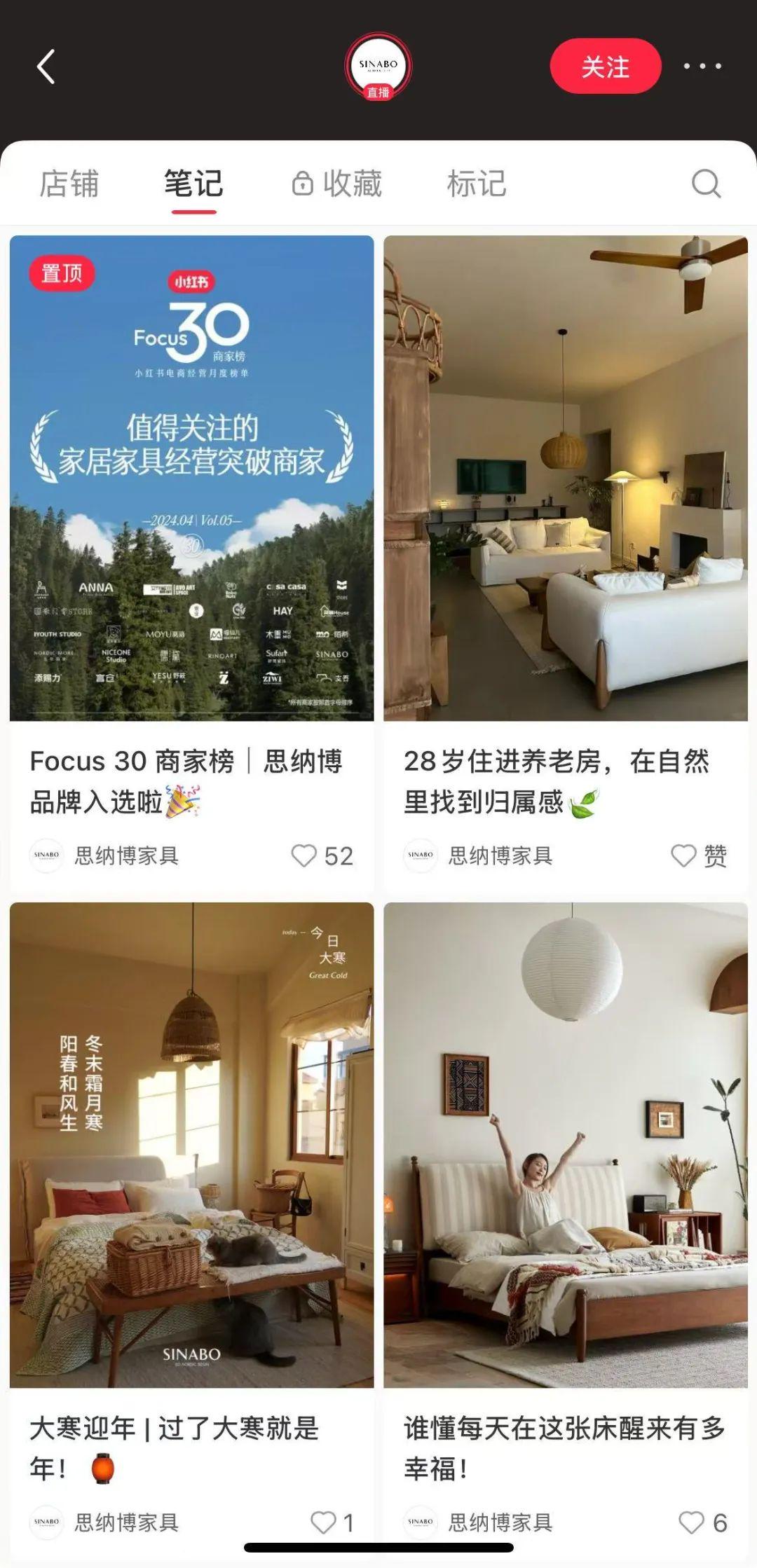
*Xiaohongshu Screenshot
Apanda's background as a "factory second-generation" endows him with a profound understanding of user needs. During his time managing the factory, he observed a strong preference for natural and eco-friendly materials, leading him to choose solid wood, pure cotton, and pure linen. Furthermore, Apanda himself is prone to static electricity, making cotton and linen products a personal choice.
After years on traditional e-commerce platforms, Apanda suddenly noticed a surge in "Sinabo"-related content shares on Xiaohongshu in 2021. Increasingly, Xiaohongshu users were visiting "Sinabo's" Taobao store post-sharing, revealing the platform's potential value for the brand.
During the 2023 618 shopping festival, Apanda personally led a dedicated team to deeply integrate with the Xiaohongshu platform. His first collaboration with Xiaohongshu buyer Yike KK generated sales exceeding 100,000 yuan, underscoring the commercial potential of Xiaohongshu e-commerce. Previously, he viewed Xiaohongshu primarily as a seed-planting platform rather than a transaction conversion channel. Consequently, he established a dedicated Xiaohongshu team of over 20 people and initiated self-broadcasting. Today, Sinabo conducts 2-3 store broadcasts with monthly GMV in the millions.
Notably, Apanda leverages his "factory second-generation" advantage, utilizing the factory's flexible supply chain to swiftly respond to Xiaohongshu users' personalized needs, realizing true "C2M" (Customer to Manufacturer).
For instance, previously, Sinabo's sofas were non-removable and non-washable. Customer feedback highlighted difficulties in cleaning these sofas, especially with naughty children. Recognizing this as a pain point, the factory swiftly developed a batch of removable fabric sofas, significantly boosting sales.
Xiaohongshu also hosts a community of pet owners. Addressing this group's needs, Sinabo introduced breathable and waterproof fabrics for sofas and bedheads, resolving the challenge of pet-soiled furniture.
Beyond direct user interaction, Sinabo collaborates with Xiaohongshu buyers to co-create popular products. For example, Sinabo's R&D team maintains close communication with home furnishing buyer Yike KK, who achieved over 100 million GMV during the Double 11 shopping festival. Yike KK values Sinabo's flexible factory and, based on her extensive experience with chair products, co-created the Richard leisure chair, which sold over 5,000 units upon launch.
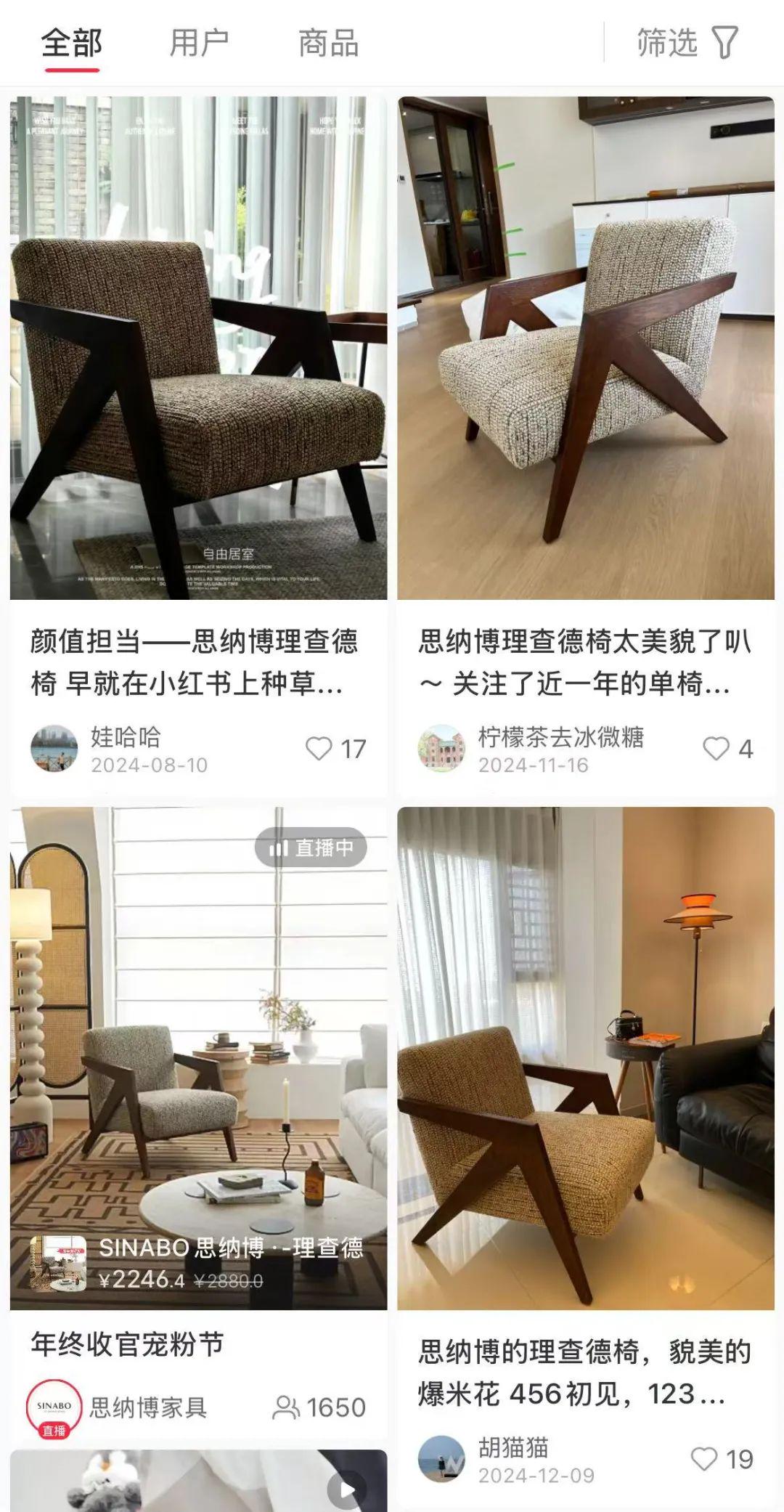
*Xiaohongshu Screenshot
Sales exceeded expectations, outstripping inventory. Apanda promptly organized the factory's supply chain to meet demand, working alongside a colleague at the factory for nearly a month to successfully fulfill orders and stock up for the new year.
Sinabo's success stems from the synergy between the "factory second-generation" characteristics and Xiaohongshu's advantages, providing personalized products at an excellent price-to-quality ratio, earning consumer loyalty through purchases. Apanda views Xiaohongshu as a turning point for the brand, transforming Sinabo "from a sales-oriented trademark to a user-centric brand."
Apanda is not alone in recognizing Xiaohongshu e-commerce's potential. A group of younger "factory second-generation" entrepreneurs has also transformed from users to Xiaohongshu brand leaders.
Tuantuan has been immersed in her family's clothing factory since childhood, studying garment pattern making after school and continuing her father's business in product development. Her father is in the cashmere clothing industry, but they had never directly engaged in online retail before Xiaohongshu.
However, Tuantuan is an avid Xiaohongshu user, sharing extensive professional knowledge about cashmere to help users distinguish between genuine and inferior products. Besides earning likes and followers, many sought product links in the comments.
"Cashmere" is expensive, often dubbed the "soft gold" of the industry. However, due to information asymmetry, most consumers struggle to identify genuine cashmere, and even pure cashmere can vary significantly in quality. This has led to a mixed market for cashmere sweaters in China, rife with fakes and inferior products.
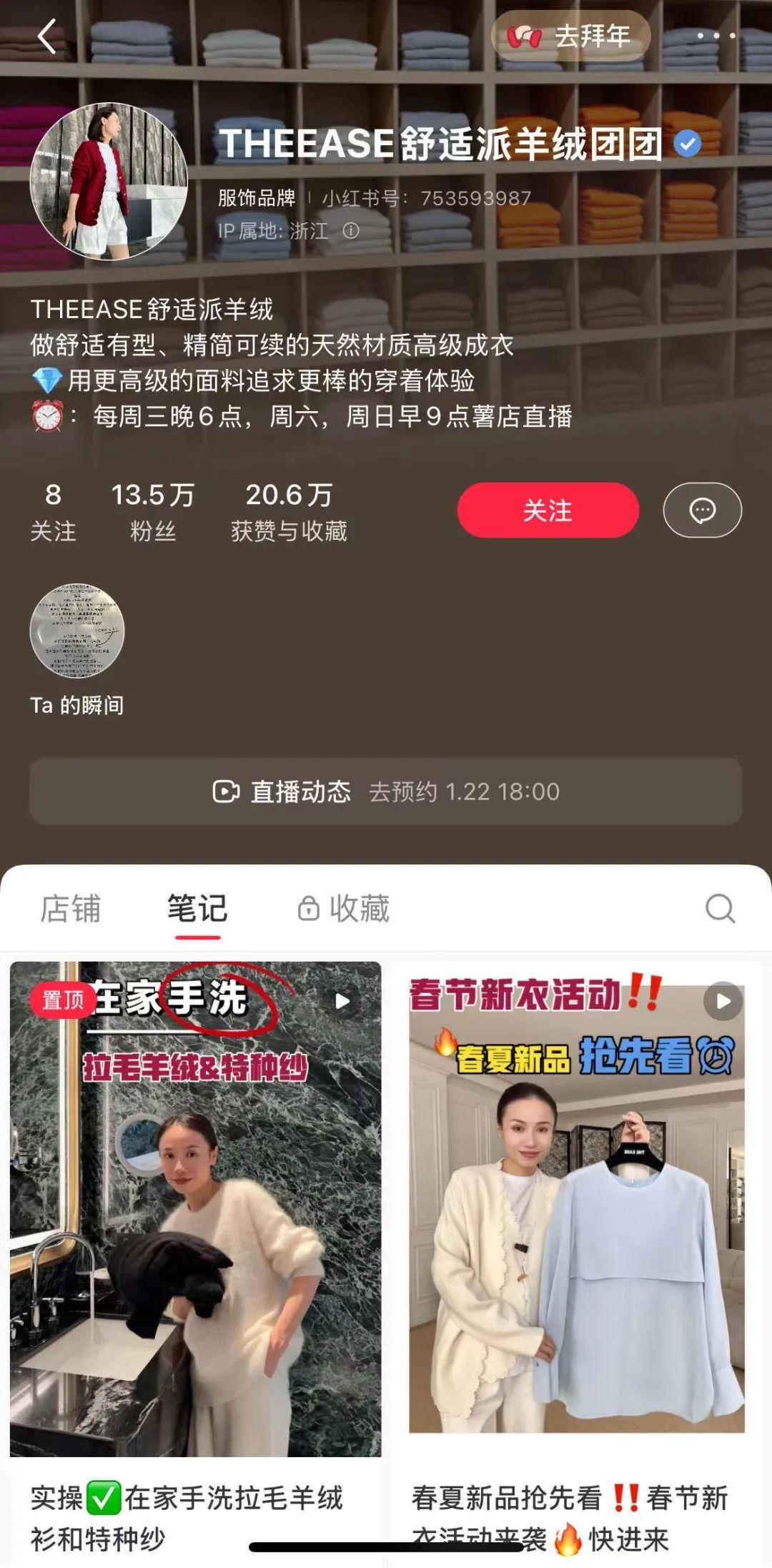
*Xiaohongshu Screenshot
These factors prompted Tuantuan to establish the cashmere apparel brand "THEEASE Comfort Faction" on Xiaohongshu, focusing on natural materials and leveraging the factory's advantages to offer consumers high-quality, cost-effective clothing without the hassle of discerning quality.
Tuantuan has a deep understanding of clothing quality. As a brand leader, she meticulously explains cashmere products' quality and design in her posts and live streams, sharing professional tips on selection and maintenance. Despite her relatively limited e-commerce experience, she quickly found a loyal user base on Xiaohongshu who appreciated her products.
In Tuantuan's view, Xiaohongshu triggers consumers' implicit needs. Many discover their needs while browsing, representing incremental sales. What makes her most comfortable with live streaming on Xiaohongshu is that she doesn't need to master sales techniques; she can focus on developing better products.
The head of the "Boss Zhou" brand also hails from a "factory second-generation" background in apparel. After graduating in 2016, she joined her family's apparel enterprise and later launched her women's wear live streaming e-commerce business. In early 2023, based on her preferred style, she founded the "Lao Ban Zhou" brand with a "minimalist" positioning, emphasizing product silhouette and quality details.
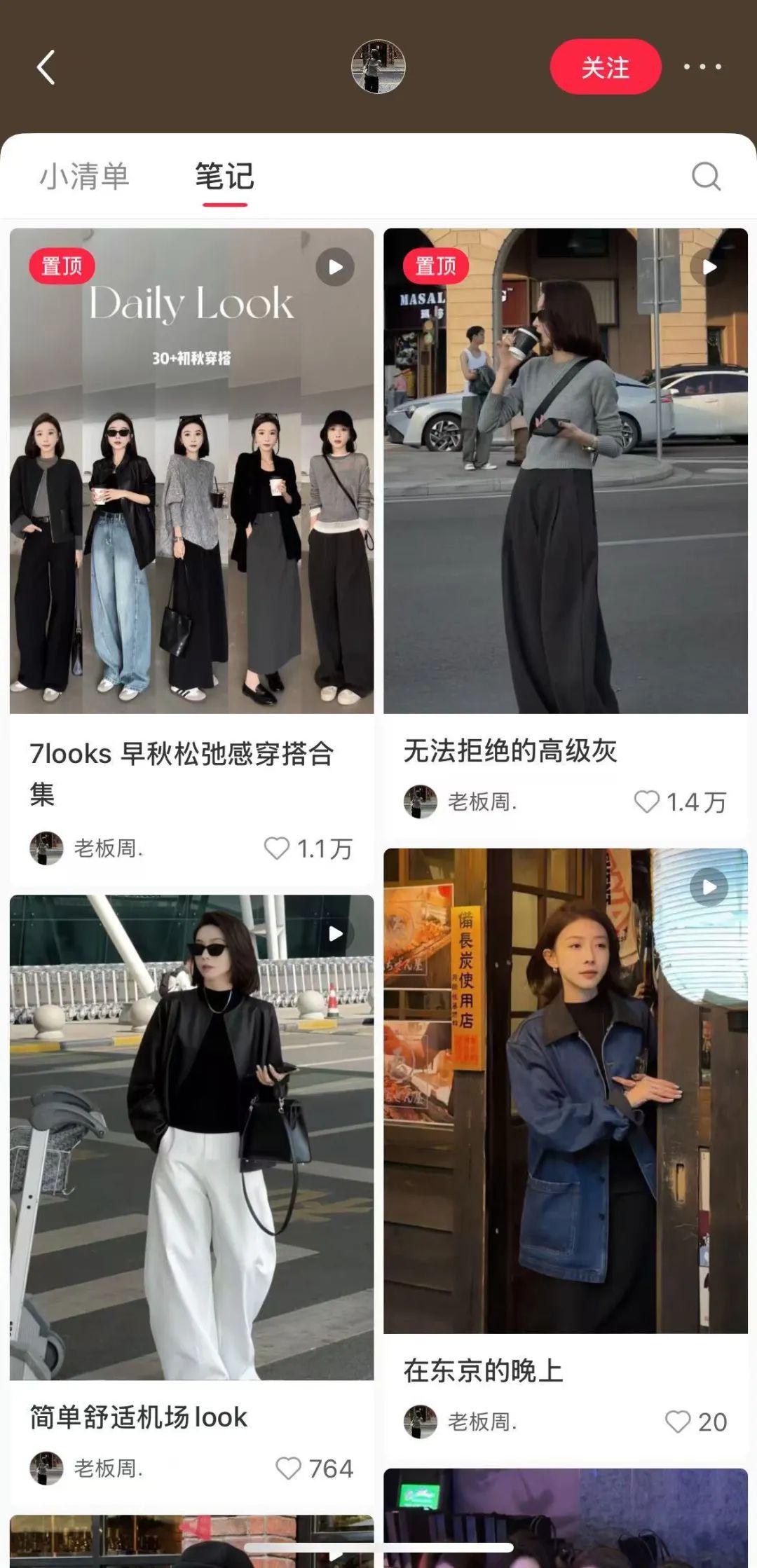
*Xiaohongshu Screenshot
Initially, she explored various platforms with unsatisfactory results. The women's wear market is fiercely competitive, characterized by low-price wars, presale difficulties, and traffic acquisition challenges, making sustainable business challenging. "Boss Zhou" gradually focused on Xiaohongshu. The platform's user group aligned with "Lao Ban Zhou's" tone, and Xiaohongshu allowed her to leverage content and professional advantages to gain more traffic and higher transaction conversions at a lower cost. Therefore, she consistently updates Xiaohongshu with content focused on fashion trends and showcasing real-life product experiences.
Beyond professional content, "Boss Zhou's" entrepreneurial advantage as a "factory second-generation" is evident. She fully utilizes the factory's supply chain, offering reasonable pricing and rapid product launches, impressing consumers with high quality and cost-effectiveness. Continuous new launches kept fans engaged, boosting repurchase rates and achieving a tenfold increase in monthly sales in 2024, with annual sales reaching 150 million yuan.
3
A famous business adage states, "There are no successful enterprises, only enterprises of the era." This is particularly true in China's retail industry. From the earliest shelf e-commerce represented by Alibaba and JD.com, solving the problem of buying more goods, to Pinduoduo's social e-commerce model expanding reach, and later to today's extreme low-price mindset; platforms like Douyin recommend interesting products based on algorithms. These are all products of continuous adaptation between users and merchants amidst new era changes.
So, what will be the next era's e-commerce form?
Recently, Ma Huateng's remarks on e-commerce garnered widespread attention. He said, "Xiaolong (Zhang Xiaolong) believes that products are information and should not be limited to WeChat Video but integrated into the entire WeChat ecosystem, approaching e-commerce from an atomic level. This approach differs from others and will go further."
The abundance of product-related note content and live streaming shares within the Xiaohongshu community follows the "products as information" logic. Roles like "Xiaohongshu buyers" and "brand leaders" at the atomic level fully leverage human factors to redefine the "people, goods, and places" formula.
"People" are no longer merely sales-generating users but also "buyers" and "brand leaders" who transform products into information, create purchase scenarios, and match personalized needs. They participate in brand co-construction and product co-creation, transcending passive consumption roles.
Today's emerging "factory second-generation" entrepreneurs in Xiaohongshu e-commerce can transform outdated factory businesses into more "sexy" ventures by offering the right products at the right price to the right users through this structure.
The growth path for supply chains, good products, and merchants is no longer confined to high-cost traffic investments and low-price internal competitions. Health and sustainability are the eternal paths to business success.
The current concentration of "factory second-generation" on the Xiaohongshu platform is not coincidental but demonstrates its unique business model creativity, successfully matching massive users' personalized needs with professional merchants, represented by the "factory second-generation," offering higher efficiency possibilities for independent brand creation.
The "factory second-generation" also represents a force in future Chinese commerce. In previous eras, their parents worked tirelessly to make China the world's factory. Today, amidst drastic changes in the consumption environment and e-commerce platforms, the "factory second-generation" has the opportunity to build upon their predecessors' shoulders, selling high-quality products from more factories through their content and new channels, fostering healthy businesses and brands, transcending mere commerce.







